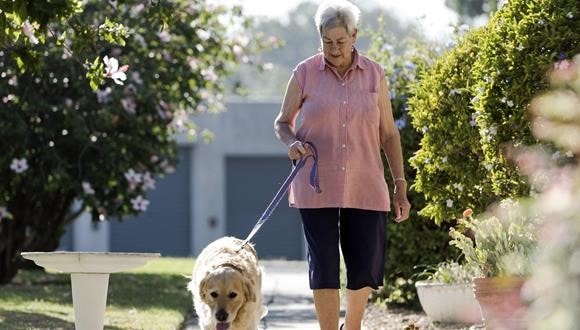Exercise for healthy bones
Published July 2015 | 1 min read
Bone health is a key factor in ageing well and exercise can help you build stronger, denser bones. Here's how to exercise to keep your bones healthy for longer.
Strong bones are vital for many of the body’s most essential functions including basic movement, protecting our organs, blood cell production, maintaining mineral levels, and supporting the body’s structure. Lower bone density can increase your risk of breaks.

How exercise can help
Regular exercise helps build stronger, denser bones, as the action of the muscles pulling on the bone stimulates bone building, Healthy Bones Australia advises.
As a guide, 30 minutes of bone-building exercise four to six times a week helps maintain bone density but your bones respond better to some types of exercise than others.
For example, cycling and swimming can be great for improving cardiovascular health, but aren’t so effective at protecting your bones.
Bone-building exercises include:
- weight-bearing exercises including walking, hiking, climbing gradients and jogging
- resistance training using equipment such as rowing machines or leg presses or free weights such as dumbbells
- high impact exercise like skipping, jogging, jumping, netball and basketball
- balance training like tai chi, yoga, and exercise ball exercises.
Form matters
The way you perform your exercise also impacts bone strength. Aim for:
- short, high intensity bursts of exercise
- high impact exercise
- making your exercise progressively harder
- variation in your exercise routine
- lifting progressively heavier weights if you’re weight training.
Positive lifestyle changes
Aside from formal exercise, day-to-day bone builders include taking the stairs instead of the lift and making time for a brisk 30-minute walk each day.
IMPORTANT INFORMATION
^ Eligible members will need to have HCF hospital cover including primary hip and knee replacements for 12 months (excluding Overseas Visitors Health Cover). Members will be accepted into the program in line with clinical criteria by the participating clinician and hospital on a patient-by-patient basis. Must be admitted at Macquarie University Hospital, East Sydney Private Hospital, Hurstville Private Hospital or Vermont Private Hospital. You must undergo your joint replacement surgery before the proposed trial program end date. The No-Gaps Joint Program is proposed to end on 31 March 2024 at Hurstville Private Hospital, 31 March 2024 at East Sydney Private Hospital, 30 April 2024 at Vermont Private Hospital and 30 September 2024 at Macquarie University Hospital.
This communication contains information which is copyright to The Hospitals Contribution Fund of Australia Limited (HCF). It should not be copied, disclosed or distributed without the authority of HCF. Except as required by law, HCF does not represent, warrant and/or guarantee that this communication is free from errors, virus, interception or interference. All reasonable efforts have been taken to ensure the accuracy of material contained on this website. It’s not intended that this website be comprehensive or render advice. HCF members should rely on authoritative advice they seek from qualified practitioners in the health and medical fields as the information provided on this website is general information only and may not be suitable to individual circumstances or health needs. Please check with your health professional before making any dietary, medical or other health decisions as a result of reading this website.